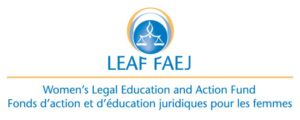Women’s Legal Education and Action Fund filed its factum
 TORONTO (September 29, 2016)–On Friday September 23rd, 2016, the Women’s Legal Education and Action Fund (LEAF) filed its factum in Gehl v Attorney General of Canada. The Ontario Court of Appeal granted LEAF leave to intervene in this case challenging sex discrimination in the Indian Act.
TORONTO (September 29, 2016)–On Friday September 23rd, 2016, the Women’s Legal Education and Action Fund (LEAF) filed its factum in Gehl v Attorney General of Canada. The Ontario Court of Appeal granted LEAF leave to intervene in this case challenging sex discrimination in the Indian Act.
Dr. Lynn Gehl is an Algonquin-Anishinaabe woman with more than five continuous generations of Indigenous ancestry. She seeks registration as an “Indian” under the registration system in the Indian Act, colloquially referred to as “Indian status”. Aboriginal Affairs and Northern Development Canada (AANDC, now Indigenous and Northern Affairs Canada) denied her registration application in 1994. The AANDC Registrar determined that Dr. Gehl does not qualify for Indian status because her grandmother did not identify Dr. Gehl’s grandfather. Pursuant to AANDC’s Proof of Paternity Policy, if the father is not listed on the birth certificate, he is assumed to be non-Indian.
Why LEAF has intervened in Gehl
LEAF has supported efforts by Indigenous women to remove sex discrimination from the Indian Act for many years. Reforms in the latter half of the last century failed to eliminate the discrimination suffered by Indigenous women under the Indian Act since Confederation. LEAF submits that the registration provisions of the Indian Act, as they are implemented by the Proof of Paternity Policy, create a distinction on the basis of sex and marital status that constitutes discrimination.
“Indian status” in Canada provides access to material benefits such as tax exemptions and financial assistance with post-secondary education. Intangible benefits include cultural connection and recognition. Status is valuable, but there are many reasons why an Indigenous woman would not register her child’s biological father. For example, a father may not be present at birth if the reserve is remote and access to hospitals is difficult, the family may lack the funds to alter a child’s birth certificate, a father may deny paternity as a result of social pressures and incentives, or a mother may choose not to disclose the father’s identity due to sexual violence, such as incest and rape. LEAF Legal Director, Dr. Kim Stanton notes:
Indigenous women are disproportionately targeted for sexual violence and they are disproportionately single parents living in poverty. An Indigenous mother should not be forced to choose between ensuring her child’s status (and the ensuing benefits) and a heightened risk of physical harm or social conflicts.
LEAF asserts that the parent who will be disadvantaged by this policy will inevitably be a woman, since it is men rather than women who are unstated on birth certificates. A policy that makes a distinction based on “unstated paternity” necessarily discriminates on the basis of sex.
In this era of reconciliation between Indigenous and non-Indigenous peoples in Canada, it is concerning that the federal government continues to uphold a statute and a policy that discriminates against Indigenous women and their children. Moreover, it is shocking that the government of Canada continues to use criteria of race and gender to determine the identities of Indigenous people.
LEAF is proud to be represented in this appeal by Renée Pelletier and Krista Nerland of Olthuis, Kleer, Townshend LLP. We are very grateful for their pro bono representation.
About Women’s Legal Education and Action Fund (LEAF)
Since April 17, 1985, when equality rights were enshrined in sections 15 and 28 of the Charter of Rights and Freedoms, LEAF has worked toward equality for women and girls. LEAF intervenes in key cases to ensure that when courts interpret equality rights, there will be a systemic improvement in women’s lives. For more information about LEAF, visit www.leaf.ca.

